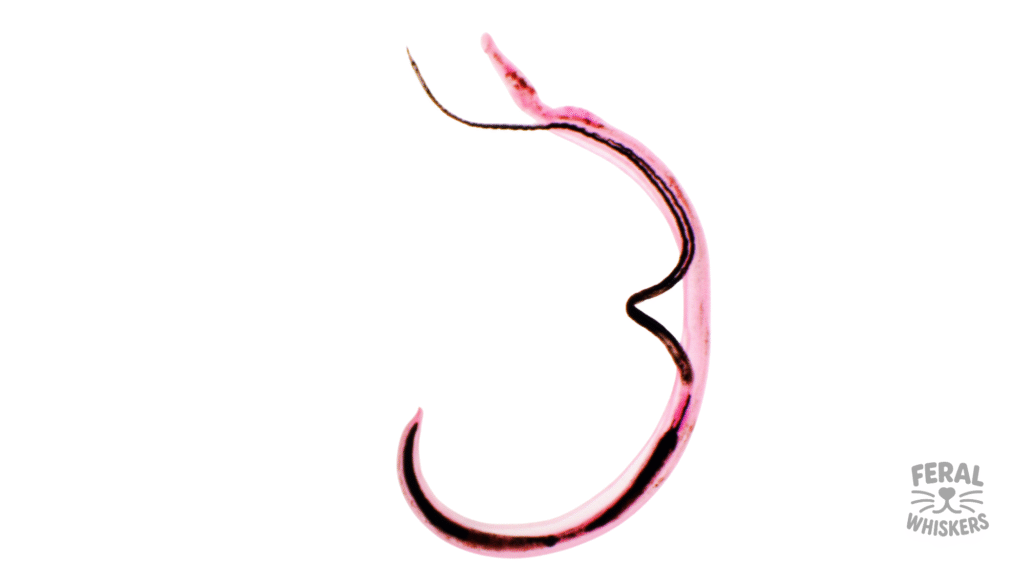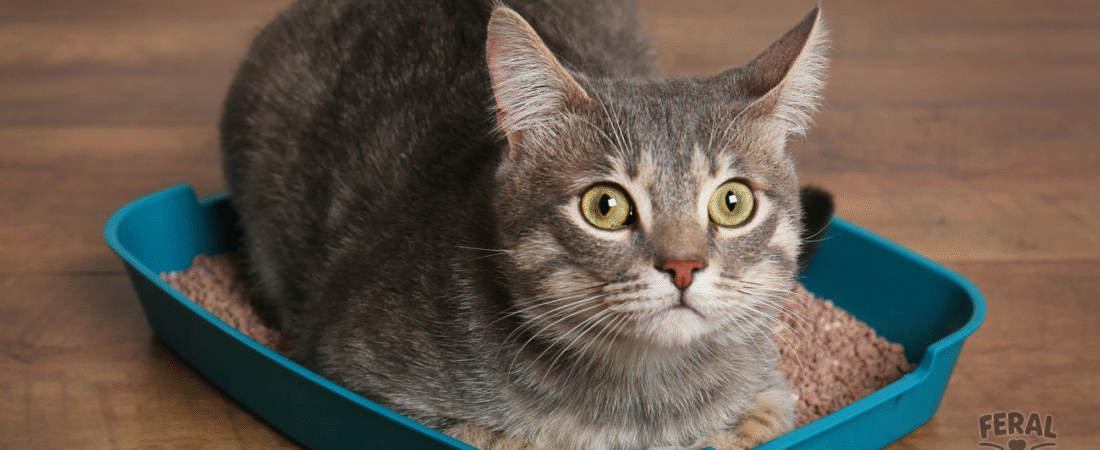📌 What Are Whipworms in Cats?

Whipworms (Trichuris spp.) are thin, whip-shaped intestinal parasites. They live mainly in the cecum and large intestine of their host.
- Rarity: Whipworms are very uncommon in cats — much more prevalent in dogs. However, rare feline cases (Trichuris campanula & Trichuris serrata) have been reported, especially in stray or outdoor cats.
- Appearance: About 4–6 cm long, with a slender “whip-like” front end and thicker back end.
- Why they matter: In high numbers, they cause chronic digestive upset, diarrhea, and inflammation of the colon.
🦠 How Do Cats Get Whipworms?
- Ingesting eggs in contaminated soil, litter, or feces.
- Outdoor environments: Eggs survive for years in moist soil.
- Hunting or grooming: Eggs can stick to paws/fur or be ingested with prey.
Luckily, whipworms are much less common in cats than other internal parasites.
🚨 Symptoms of Whipworms in Cats
Cats with whipworms may show chronic or recurring digestive issues:
- Intermittent diarrhea, sometimes bloody or with mucus.
- Weight loss.
- Dehydration.
- Irritated, inflamed colon → straining in the litter box (tenesmus).
- Poor coat quality from malnutrition.
- In heavy infestations: Severe electrolyte imbalances and lethargy.
⚠️ Many cats show mild symptoms or none at all, making whipworms easy to miss.
🔍 Diagnosis
- Fecal flotation (microscope): Detects whipworm eggs, though their shedding is sporadic.
- Repeat stool samples: Often required to confirm.
- Colonic exam (rare cases): For chronic unexplained diarrhea.
💊 Veterinary Treatment for Whipworms in Cats
- Fenbendazole (Panacur®): Commonly prescribed, often for 3–5 days, repeated after 3 weeks and again at 3 months.
- Other broad-spectrum dewormers may cover whipworms but not all feline wormers are effective.
- Re-dosing is necessary because whipworm eggs survive long in the environment and reinfection is common.
- Supportive care: Fluids and diet adjustments for chronic diarrhea cases.
⚠️ Not all cat wormers treat whipworms — your vet must prescribe the appropriate one.
🌿 Holistic & Kitchen Supports for Cats with Whipworms
Holistic remedies support gut health and hygiene but cannot kill whipworms alone:
🎃 Pumpkin (Puree or Ground Seeds)
- Adds fiber; helps regulate bowels and firm up loose stool.
🥥 Coconut Oil
- Antimicrobial; supports gut health and stool balance.
- Use: ⅛ tsp, 2–3 times weekly.
🥕 Grated Carrot or Zucchini
- Provides fiber and mild intestinal “sweeping.”
- Use: Tiny pinch mixed in food.
🌱 Slippery Elm Bark Powder
- Soothes inflamed intestinal linings and reduces irritation from diarrhea.
🧉 Probiotics
- Essential post-treatment; restore gut flora and reduce chronic digestive issues.
🏡 Home & Environmental Hygiene
Whipworm eggs are hardy and survive years in soil/litter:
- Scoop litter boxes daily and dispose of waste properly.
- Thoroughly wash litter trays weekly with hot water and pet-safe disinfectant.
- Wash bedding, blankets, and toys weekly.
- Keep outdoor cats away from contaminated soil and discourage hunting.
- Vacuum/mop regularly to prevent ingestion of tracked particles.
🛡️ Prevention
- Routine broad-spectrum deworming (vet-prescribed).
- Fecal checks twice a year in multi-cat households.
- Strict litter hygiene in homes with kittens or compromised cats.
- Keep cats indoors or supervised outdoors to limit soil exposure.
🌱 Quality of Life
- Cats recover well when whipworms are treated.
- Chronic diarrhea improves with proper medication and supportive holistic aids.
- Keeping the environment clean reduces reinfection risk.
- Since whipworms are so rare in cats, most owners only need to worry about prevention and general hygiene unless living with multi-pet or stray cat populations.
❓ FAQs
Q1: Can humans get whipworms from cats?
No. The species that infect cats do not infect humans.
Q2: Are whipworms common in indoor cats?
Very rare. Indoor cats are at almost no risk unless exposed to contaminated soil/litter.
Q3: Can pumpkin seeds cure whipworms in cats?
No. They may improve digestion but don’t eliminate infection. Veterinary medication is required.
Q4: How long do whipworm eggs survive in the environment?
Up to 5 years in moist soil — making reinfection possible without cleaning.
💡 Final Thoughts
Whipworms in cats are rare, but possible, particularly in outdoor or stray cats. They mainly cause chronic digestive issues rather than acute illness.
✅ Best Defense:
- Use veterinary wormers like fenbendazole.
- Add holistic gut supports (pumpkin, probiotics, slippery elm).
- Focus on sanitation and prevention to stop stubborn reinfections.

